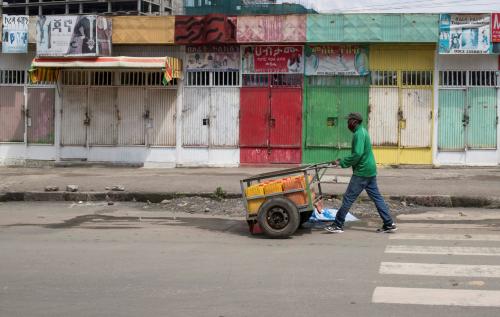Editor’s Note: On December 13, Brookings and Global Witness hosted The Transparency, Conflict Minerals and Natural Resources: What You Don’t Know About Dodd-Frank, an event examining Sections 1502 and 1504 of the Dodd-Frank Wall Street Reform and Consumer Protection Act. The agenda and full transcript can be found here.
With a focus on conflict minerals and natural resource transparency, Sections 1504 and 1502 of the Dodd-Frank Wall Street Financial Reform Act are unrelated to the U.S. banking system. Yet they have stirred up controversy. As is often the case with provisions that aim at changing the rules of the game, Sections 1502 and 1504 have pitted stakeholders that support their passage and full implementation against the interests of those that wish to water them down or greatly delay their implementation. Last Tuesday, Brookings and Global Witness hosted an event at the National Press Club to examine the debate surrounding these two provisions.
Representative Jim McDermott kicked off the event by explaining that passing Sections 1502 and 1504 is only half the battle. The eventual effectiveness of these provisions largely depends on how the final rules are written and implemented. If well implemented, they could contribute to increased transparency, empower citizens to capture the gains from natural resource wealth and deny financing to dangerous armed groups in the Democratic Republic of Congo and the surrounding countries. However, if opponents of these rules succeed in sufficiently watering them down, many of these gains will not be attained. With this in mind, panelists and participants from civil society, the private sector, financial sector and think tanks discussed the benefits, potential costs and implementation challenges of Sections 1502 and 1504.
The first part of the discussion, moderated by Simon Taylor from Global Witness, focused on the costs and benefits of Section 1504, which requires U.S. companies in extractive industries to report project-level payments made to foreign governments. Isabel Munilla from Publish What You Pay (PWYP) emphasized that with detailed information, citizens, civil society organizations and NGOs will be able to monitor corporate and government interactions, hold both groups accountable, and ensure that natural resource wealth contributes positively to local development and livelihoods. Daniel Kaufmann pointed out that data and research from around the world suggests that in the long run, with increased transparency and accountability, citizens could see up to a 300 percent development dividend from improved governance – i.e. their incomes per capita could triple.
Bennett Freeman from Calvert Investments suggested that transparent companies attract more investors because disclosure clarifies investment risks. And Laurel Green from Rio Tinto also supported implementation of these disclosure reforms, pointing out that such transparency can be a competitive advantage since firms can provide host governments with clear evidence of how they contribute to government revenues and communities. Yet not all companies may view such transparency reforms to their advantage. From an economic incentive standpoint, Kaufmann highlighted that, as with practically every rule, Section 1504 also means that there will be winners and losers. Companies that focus on efficiency and innovation stand to benefit, while those that derive gains from rent-seeking, monopolistic behavior or tax avoidance would have an interest in maintaining an opaque status quo.
Some large companies and industry associations that are opposed to the disclosure rule in Section 1504, such as Shell and the American Petroleum Institute, have suggested that project level disclosure will be very costly, position publicly traded firms at a competitive disadvantage, and possibly face in-country discrimination in places with lack of disclosure. There was discussion suggesting that these claims may be exaggerated during the panel. The reality is that companies already have systems in place to track revenues and payments. In fact, even though Section 1504 is not under implementation yet, some large corporations— like Rio Tinto, Statoil and Newmont Mining, among others— already disclose payments in every country of operation. Further, as reported by some companies that are already disclosing, there does not appear to be compelling evidence that companies will face major penalties by non-transparent governments.
Some companies are also concerned that competitors could use disclosed information to their advantage. First, the information that should be disclosed does not appear to fall under the proprietary trade secrets category. Furthermore, since the rules cover all companies listed on the U.S. stock exchange, major companies like Shell, Exxon and BP are covered, as are some state-owned ones, like Petrobras and Petrochina. Last, and not least, disclosure requirements along the lines of Section 1504 are already being drafted in the European Union, and consideration of similar rules is also taking place in South Korea and Hong Kong, which would widen the network of companies covered and further level the playing field. If anything, firms listed in the U.S. can get a head start on those companies not yet covered by disclosure requirements.
Since it will be virtually impossible to roll back Section 1504 on transparency in natural resources as well as difficult for companies to oppose transparency from a public relations perspective, the strategy by companies opposed to disclosure has been to lobby for watering down the eventual rules issued by the Securities and Exchange Commission and to delay the effective implementation of the rules. The most important component in watering down such provisions would be to make disclosure a requirement merely at the aggregate country-level rather than at the project-level. This loss of this crucial detail would greatly reduce the impact of the measure. All the panelists during this session, including those from the private sector, argued in favor of detailed project-level disclosure.
In the second session, panelists and participants discussed Section 1502, which requires companies that source minerals from Congo-DRC and adjacent countries to disclose whether they use conflict minerals. The rule relies on the adverse reputational impact of such disclosure rather than mandating penalties for actually sourcing minerals from conflict-afflicted regions where militias may be benefitting from this trade. No reputable company wants their product associated with armed conflict, human rights violations, slavery and rape. Yet again there are some companies that support these reforms, while others oppose them.
Corinna Gilfillan from Global Witness, Delly Sesete from CREDDHO in the DRC, and several participants in the audience from the DRC region emphasized that although Section 1502 will not itself end conflict in Congo, it could hold companies accountable for sourcing from mines controlled by militias. The U.N. Group of Experts on Congo has already found that since the signing of the Dodd-Frank bill, there has been a reduction in the portion of mined minerals that is funding the conflict. By denying financing to the armed groups that perpetuate violence in the region, the provision can contribute to increased stability and improved human rights.
As with Section 1504, some companies are claiming that implementation costs associated with conflict minerals in Section 1502 will be very high. There are numerous estimates of these costs, ranging from the SEC’s estimate of $71.2 million to the National Association of Manufacturers’ (NAM) estimate of $9-$16 billion. Recent estimates produced independently by the Claigan Environmental consulting firm and presented by Bruce Calder during this panel suggest that costs to the industry are expected to be less than $815 million.
In fact, some proactive companies (both domestic and foreign) are already showing that tracking supply chains is both practically and financial feasible. Sandy Merber from General Electric and Tim Mohin from AMD discussed how pooling industry resources could help offset individual firm costs. The Electronics Industry Citizenship Coalition and the Global e-Sustainability Initiative have partnered with firms to develop the “Conflict Free Smelters Program“, which allows companies performing due diligence to trace their mineral supply chain down to the smelters who are certified as being either conflict free or not. Efforts are being made to now certify smelters in the DRC region under this program to help preserve access to the international markets for impoverished artisanal miners. Yet the companies that have already taken the lead in tracking the supply chain are a minority, and thus they are bearing a disproportionate share of the cost for so doing. Once the rules are issued and regulations implemented, this cost would be spread among a larger universe of firms.
There are concerns among some in the DRC that Section 1502 will have negative unintended consequences on citizens in the region. They suggest that the disclosure requirements are driving firms out of the DRC, citing falling mineral trade as evidence. Yet Section 1502, which has not yet even been implemented, cannot solely be blamed. Since April 2010, when the DRC-government-imposed six-month minerals embargo ended, trade in minerals has been on the rise. Sesete argued that much of the talk of unintended consequences was akin to fear mongering. He and others have pointed out that the mineral trade in that region is a relatively recent activity and citizens had (and continue to have) other sources to support their livelihoods. Further, he emphasized that the benefits of increased security and reduced violence and instability are too great to dismiss Section 1502 outright.
In the end, as pointed out by Mark Taylor from FAFO, the ability of Sections 1502 and 1504 to achieve their goals depends heavily on effective implementation. The final rules on these two provisions have yet to be released by the SEC. Therefore, the uncertainty surrounding the final rules has contributed to speculations on the cost (both to companies and countries) of implementation. The sooner these regulations come out and the clearer the standards they set are, the greater chance these provisions will have in maximizing the benefits to global transparency, accountability and governance.
As Senator Ben Cardin reminded the audience during his closing presentation, the importance of Sections 1502 and 1504 transcends U.S. companies and Central Africa. Indeed, while the SEC should carefully weigh potential benefits and costs in the implementation of Section 1502 and 1504, the balance should be in favor of transparency.
And the importance of leadership should not be ignored: these specific disclosures in Dodd-Frank will signal that the U.S. is taking the lead globally on these important aspects, potentially nudging other key financial centers to do likewise and thus benefitting governance, security and human rights in many corners of the world.



Commentary
Op-edTransparency, Conflict Minerals and Natural Resources: Debating Sections 1502 and 1504 of the Dodd-Frank Act
December 20, 2011